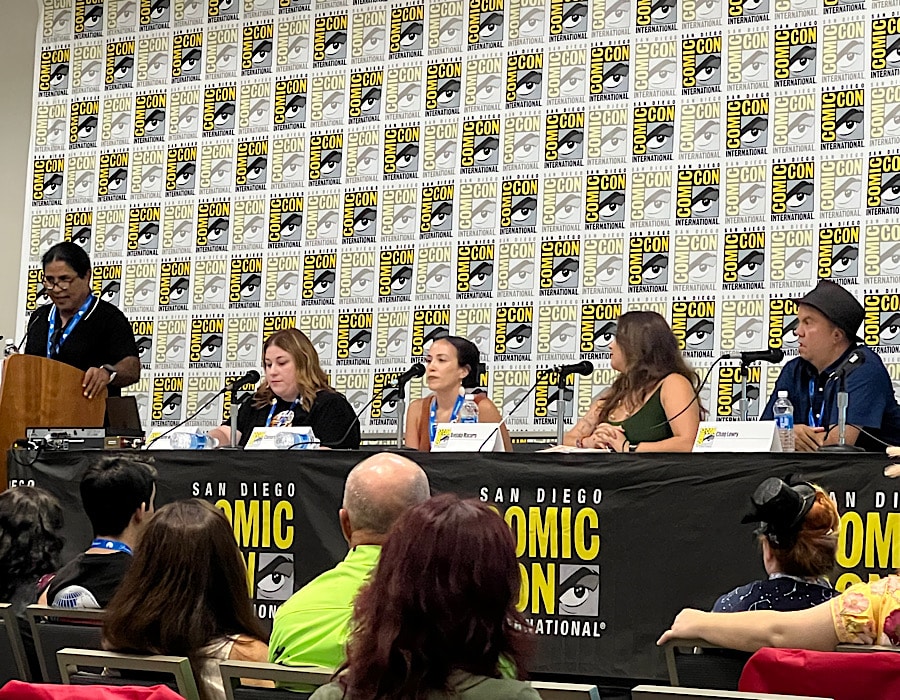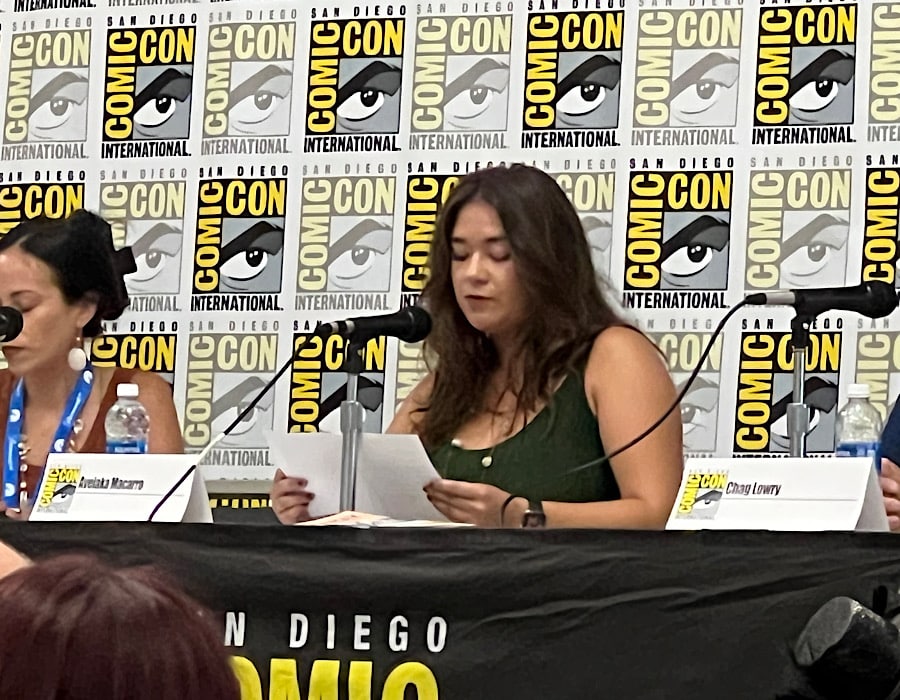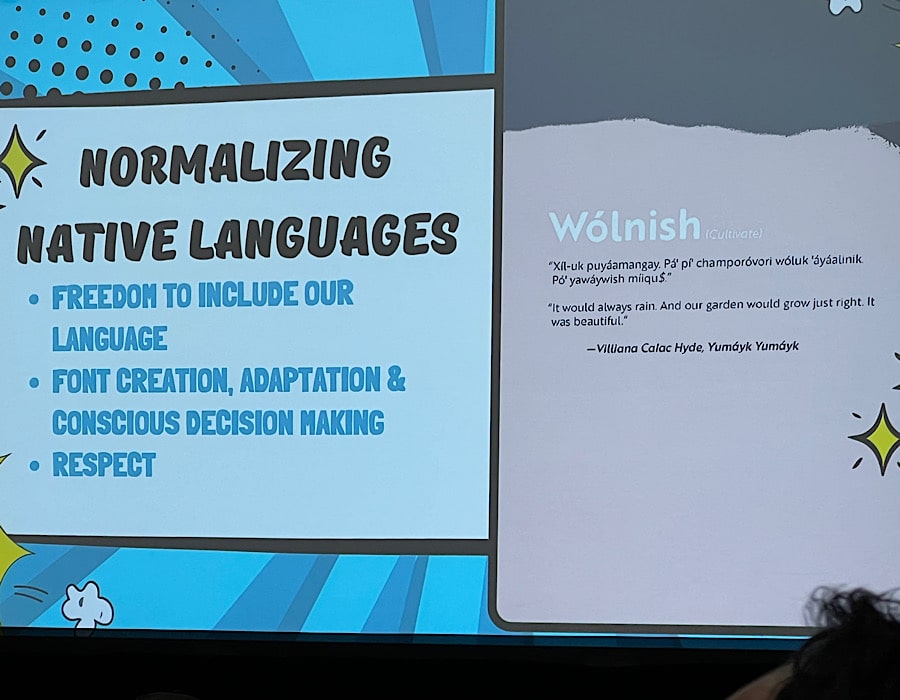Tribally-owned Nice Oak Press was established a decade in the past by California’s Pechanga Tribe and has supplied an avenue to nurture and increase the information of indigenous voices. The publishing home was at San Diego Comedian-Con on July 26, 2024 to advertise two titles of their repertoire and to speak about language revitalization tasks by means of Chag Lowery’s graphic novel, Troopers Unknown.
Nice Oak Press director and editor-in-chief Lauren Niezgodzki and Kumeyaay artist Johnny Bear Contreras moderated “Writing Their Realities: California’s First Indigenous Press,” which included Lowery and writers and editors Camaray Davolos and Avelaka Macarro of the Pechanga Tribe.


Macarro kicked off the dialogue with a studying of “Regeneration” by Marlene Dusek of Pay-mkawichum, Kumeyaay-Ipai, and Cupa descent earlier than launching into the mission of Nice Oak Press.
“One of many issues that’s fairly completely different is our editorial board is made up of individuals from our cultural sources division serving to sensitivity readers, reality checkers, language audio system, professionals in Indigenous Research,” defined Niezgodzki.
“Our govt board is made up of our tribal council, so we glance to them for steering and approval and transferring ahead with our tasks. One of many issues that’s actually distinctive about our press is that we weren’t recruited to be worthwhile. We have been created as a result of we now have a mission in thoughts, and that was to create a platform for indigenous authors and artists. Our essential objective is to be advocates for indigenous voices and publish works which might be essential to indigenous peoples.”
As a Native American research main at California State Polytechnic College, Humboldt, a lot of the course readings targeted on Northern California indigenous cultures. Sensing a chance to fill within the gaps for Southern California sources, Davolos returned residence and to Nice Oak Press with the mission of uplifting the historical past of indigenous ladies in Southern California.
“A few of our native folks, I’ve heard say, that Southern California native of us don’t have tradition anymore, which is admittedly hurtful and false. And in the event that they’re considering that and saying that, then what are non-native folks considering and saying about us? So, that was form of how Yáamay got here to be, this understanding that we want extra views and first supply materials that offers with our voices, telling our joys, our triumphs, our actual histories, and all the pieces in between.”
Based on Macarro, Yáamay took 5 years from preliminary idea to manufacturing, with Macarro, her cousin Rebecca Macarro and Davalos working remotely to gather tales by means of textual content messaging, Fb and Instagram. This work allowed the trio to reconnect with their tribal roots, and Nice Oak Press allowed them to retain management over the narrative being produced.


“Proper now, there’s a fantastic push for native illustration. Marvel has two native characters. There’s a push on-line to make Wolverine native as a result of he’s from Canada. And since he’s from Canada, there’s potential to be a First Nations particular person. That’s the deal for me, however considering of this media illustration, it’s nonetheless within the confines of that huge price range,” mentioned Macarro. “This issues to us as a result of it makes an enormous distinction in what we’re in a position to produce, in addition to the care for those that are buying from us.”
Davolos spoke of how Niezgodzki inspired the trio to make use of Wólnish, their native language, all out of respect for folks’s tradition and other people’s views. A part of the method concerned hiring linguists and font creators and tribal printers to incorporate particular characters that will extra precisely mirror the intricacies of the language. That, in keeping with Davolos, is what distinguishes Nice Oak Press from different publishers.

“It was actually essential for us to seek out methods to dwell language and the best way the household respects it. It’s additionally a part of the group, a part of the thought of telling our personal tales, utilization our personal language pays respect to our ancestors who’re in a position to preserve and domesticate it,” mentioned Davolos. “Domesticate, not simply this concept of defending it, however letting it develop in a distinct model, in several methods, and creating one thing.”
Documenting the language, in keeping with Davolos, is essential in preserving a cultural legacy that Western civilization have devastated, a method to reclaim their collective voices. Lowery went a step additional by highlighting how the language displays upon bigger environmental considerations and the influence that governmental insurance policies have had in defining land relationships.
Lowery’s graphic novel seems to be at native folks, and his household’s generational relationship of service, within the navy from World Battle I onwards.
“Native folks weren’t US residents at that time, which at all times blew my thoughts” he defined. “So, I had labored with the artist [Rahsan Ekedel] for a bit over three years to create this e book, and on the tail finish I occurred to fulfill Lauren. I actually appreciated her relationship on the press as a result of I don’t look after publishers. I produce my very own work, and the persons are my editors.
As a local folks, we should personal each facet of the construction that produces our tales, and for a such a very long time, we now have not been in a position to personal that construction. So, this very historic.”
With Troopers Unknown, Lowery and Niezgodzki made a concentrated effort to not “otherize” the language. They needed to protect the language and permit readers to expertise storytelling from the mix of images and textual content. It is a idea that Nice Oak Press carries into its many tasks.
“We now have a whole lot of youngsters’s books that we’ve developed, and like Chag was saying, these should not vainness tasks. We create these books with intention,” mentioned Niezgodzki. “These books are utilized in our kids English College, which is on the reservation. Lecturers must know the language to have the ability to train us. However we’re not stopping there. We now have been in discussions with the college districts. We’re attempting to alter the curriculum. That’s our final objective. We need to right the narrative that we’ve pulled time and time once more.”
Keep tuned for extra SDCC ’24 protection from The Beat.



